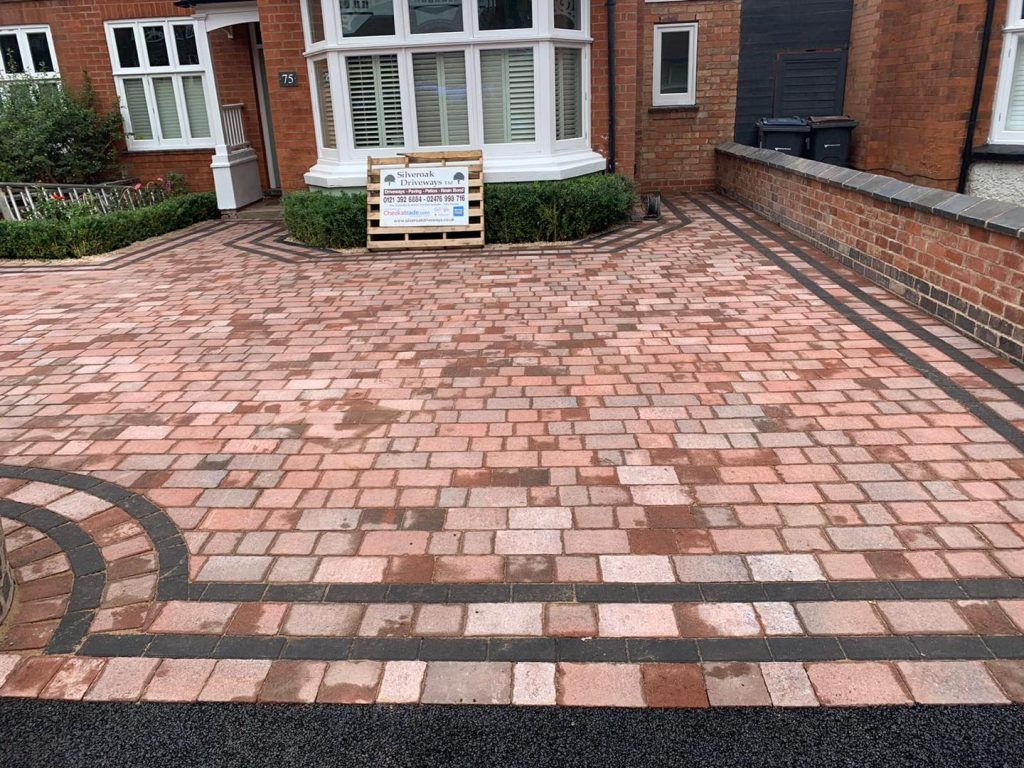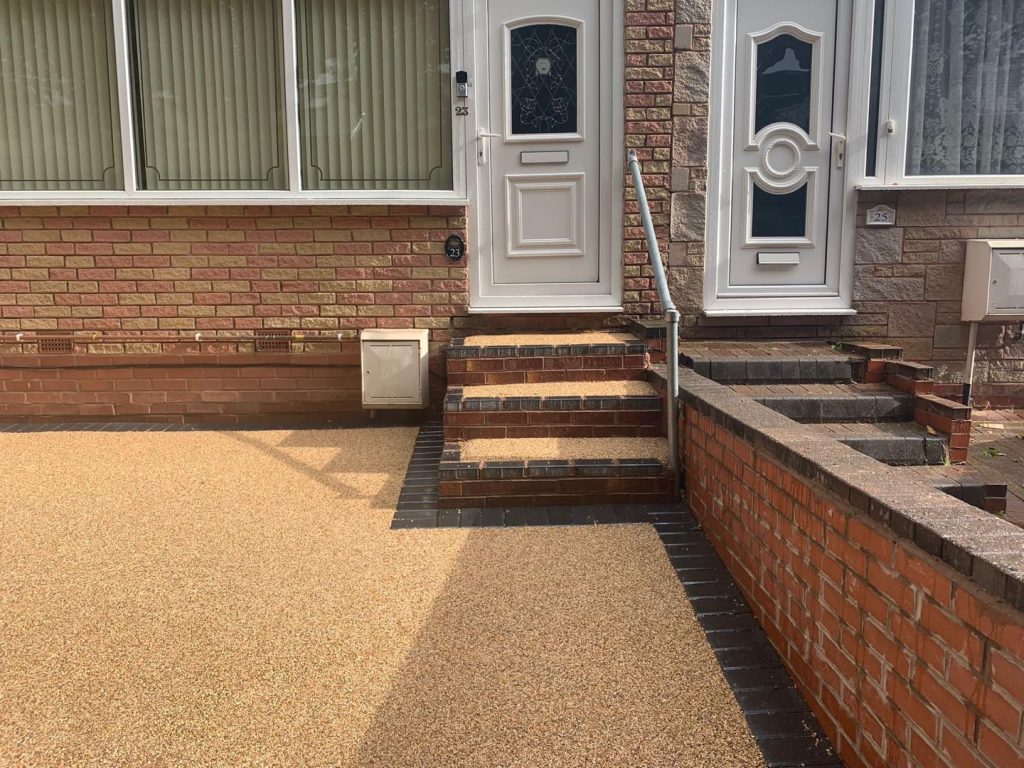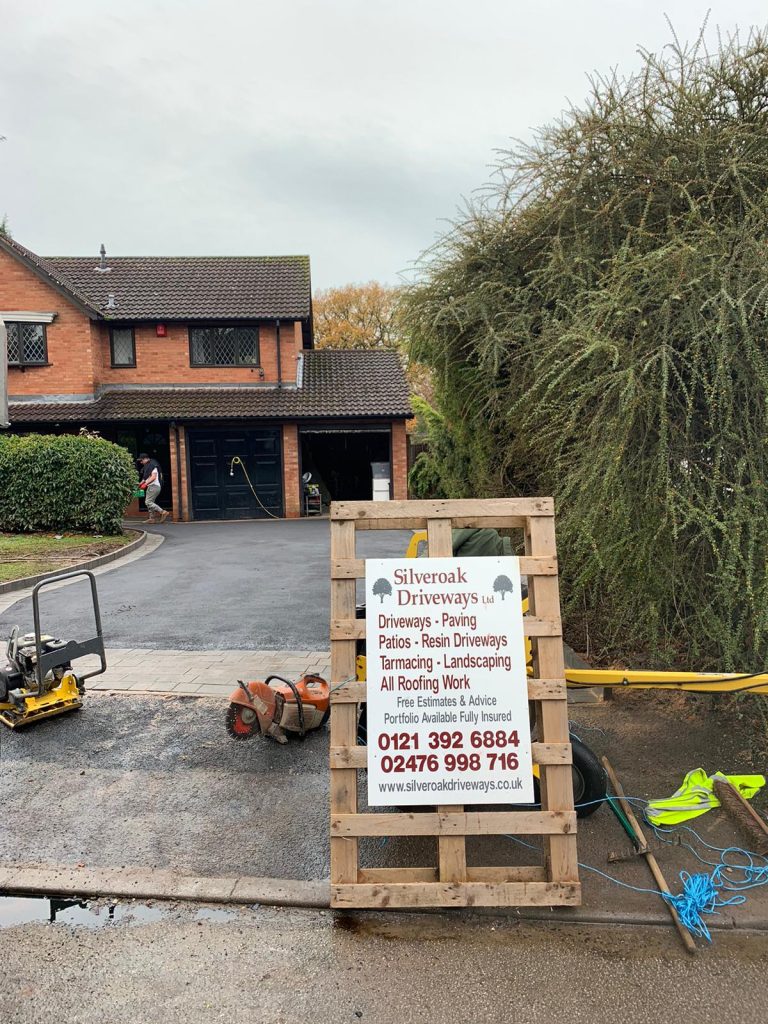When considering a new driveway, two of the most popular options among UK homeowners are block paving and resin-bound surfaces. Each offers a unique blend of durability, aesthetics, and maintenance requirements, making the decision a crucial investment in your property’s curb appeal and long-term functionality.
Choosing the best driveway surface depends on several factors, including cost, durability, maintenance, and environmental impact. While block paving provides a traditional and highly customisable look, resin-bound driveways offer a modern, low-maintenance alternative with excellent drainage properties.
In this guide, we’ll compare the pros and cons of each material, examine cost considerations, and discuss which driveway type is likely to last longer, helping you make an informed decision that will last for years to come.
Block Paving Driveways – Pros and Cons

Block paving consists of individual bricks or concrete blocks arranged in various patterns over a compacted sub-base. It is a highly popular choice among homeowners due to its versatility, durability, and ability to enhance a property’s aesthetic appeal.
Advantages of Block Paving
Customisable Appearance
One of the biggest benefits of block paving is its wide variety of design options. Homeowners can choose from different colours, textures, and patterns to create a driveway that complements their home’s exterior. Whether you prefer a contemporary herringbone layout or a more traditional basketweave pattern, block paving offers complete design flexibility.
Easier Repairs
Unlike other driveway materials that may require extensive resurfacing, block paving allows for easy repairs. If a section becomes damaged due to cracks or stains, individual blocks can be lifted and replaced without disturbing the entire driveway, making maintenance more convenient and cost-effective.
High Durability and Load-Bearing Capacity
Block paving is well-known for its strength and ability to withstand heavy vehicle traffic. When installed on a solid sub-base with proper jointing and sealing, a block-paved driveway can last for decades with minimal deterioration.
Disadvantages of Block Paving
Weed Growth Between Joints
Over time, weeds and moss can grow in the gaps between the blocks, leading to an unkempt appearance. Regular maintenance, such as power washing and applying jointing sand, is necessary to keep weeds at bay – this RHS guide provides a beneficial insight into the importance of weed control.
Potential for Sinking or Shifting
If the sub-base is not correctly prepared, block paving can develop uneven surfaces, leading to sinking or shifting under the weight of vehicles. To prevent this, professional installation with adequate ground preparation is crucial.
Ongoing Maintenance
To maintain its appearance and structural integrity, block paving requires periodic re-sanding and sealing. Over time, rain and vehicle movement can wash out the jointing sand, reducing stability. Regular upkeep ensures the driveway remains in top condition and prevents long-term deterioration.
Resin-Bound Driveways – Pros and Cons

A resin-bound driveway is made by mixing natural aggregates, such as gravel or crushed stone, with a high-quality resin. This combination creates a strong, smooth, and visually appealing surface. Unlike traditional paving methods, resin-bound driveways offer a contemporary look while maintaining excellent durability. The seamless finish and range of colour options make it a popular choice for modern homes.
Advantages of Resin-Bound Driveways
Permeable Surface for Better Drainage
One of the biggest advantages of resin-bound driveways is their permeability. These surfaces are Sustainable Urban Drainage Systems (SUDS)-compliant, meaning they allow water to drain through naturally. This reduces surface water runoff, helping to prevent puddling and lowering the risk of flooding—a key benefit for UK homeowners as confirmed by this GOV.UK guide.
Low-Maintenance
Unlike block paving, resin-bound driveways require minimal maintenance. The seamless surface prevents weed growth, and routine cleaning—such as occasional jet washing—helps maintain its appearance. Since there are no joints or gaps, there is little risk of weed infestation or displacement.
Modern Aesthetic Appeal
Resin-bound driveways offer a sleek and contemporary appearance. Available in a wide variety of natural stone colours, they can be customised to complement any property style. The smooth, non-slip finish also enhances safety while adding a touch of sophistication.
Disadvantages of Resin-Bound Driveways
Higher Initial Cost
Resin-bound driveways are generally more expensive upfront compared to block paving. The cost varies depending on the quality of materials, size of the driveway, and installation complexity. However, many homeowners find the long-term benefits outweigh the initial investment.
Sensitive Installation Process
The success of a resin-bound driveway largely depends on expert installation. The resin and aggregate mixture must be prepared and laid correctly within a specific timeframe to ensure a durable and even surface. Poor installation can lead to uneven patches, weak spots, or premature wear. Hiring experienced professionals is essential to achieving the best results.
Potential for Damage Under Heavy Loads
Although resin-bound surfaces are durable, they can be prone to damage if subjected to excessive weight, such as from heavy vehicles or frequent pressure from turning wheels. If not properly installed on a solid base, the surface may develop cracks or indentations over time. Ensuring a high-quality sub-base is crucial for longevity.
Cost Comparison & Longevity

The overall cost of installing a new driveway varies depending on several key factors, including:
- Material Costs – The type and quality of materials used will significantly impact pricing.
- Labour Fees – Skilled installation is essential, and labour costs can differ based on complexity.
- Ground Preparation Requirements – Additional groundwork, such as excavation or drainage improvements, can add to the cost.
- Driveway Size – Larger driveways naturally require more materials and labour, increasing the total expense.
Typical Costs
Here’s a general price guide for two of the most popular driveway options:
- Block Paving: £50 – £100 per m² – See our Block Paving service page for more information
- Resin-Bound: £60 – £90 per m² – See our Resin Bound service page for more information
Which Driveway Lasts Longer?
- Block paving driveways can last 20-25 years with regular maintenance, such as cleaning, re-sanding, and sealing.
- Resin-bound driveways typically last 15-20 years, depending on the quality of installation and level of usage. Their smooth, permeable surface provides excellent drainage but may be vulnerable to damage under heavy loads.
While block paving may have a longer lifespan with proper care, resin-bound driveways offer a low-maintenance alternative with superior drainage capabilities. Choosing the right option depends on your priorities for durability, upkeep, and aesthetic appeal.
Both block paving and resin-bound driveways offer excellent durability, aesthetics, and functionality. However, the best choice depends on your priorities. If you want a customisable design with easy repairability, block paving is ideal, however, if you prefer a low-maintenance and permeable surface, resin-bound driveways are a great option.
Get in Touch Now

At Silver Oak Driveways, we specialise in high-quality driveway installations across Birmingham and surrounding areas. Whether you need block paving in Birmingham or a resin driveway in Birmingham, our team can help you choose the right solution.
Contact us for a free consultation now and expert advice on your new driveway.
